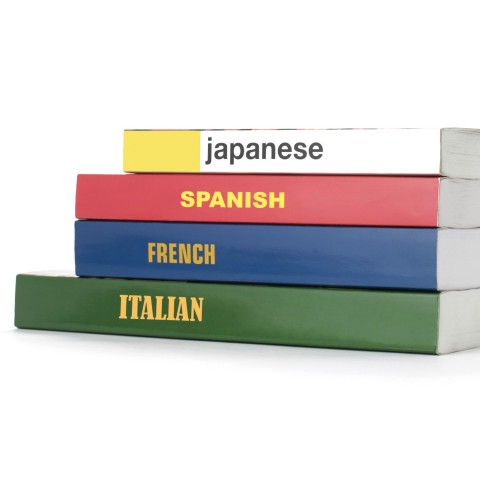
Have you ever tried to use a newly learned Japanese phrase, only to panic when you couldn’t understand your interlocutor’s reply?
Whether you’re making new Japanese friends or traveling in Japan, knowing how to give questions and answers in Japanese will allow for smoother communication. Learning how to ask Japanese questions will also help you better understand Japanese, and improve your speaking and listening skills. The keys to mastering these skills early on are to speak a lot and practice!
In this article, we’ll introduce the ten most useful Japanese question & answer patterns. Even if you’re just getting started, you can start having basic conversations with these phrases! Learn how to speak Japanese here at JapanesePod101.com!
First things first, though: How do you form questions in Japanese?
Japanese questions are easy to recognize because the question particle か (ka) always appears at the end (formal / polite form), and questions are asked with a rising tone.
 Table of Contents
Table of Contents
- What’s your name?
- Where are you from?
- Do you speak Japanese?
- How long have you been studying Japanese?
- Have you been to [location]?
- How is ___?
- Do you like [country’s] food?
- What are you doing?
- What’s wrong?
- How much is this?
- How JapanesePod101 Can Help You Learn More Japanese
1. What’s your name?

Question:
- Japanese: (あなたの)名前は何ですか。
- Reading: (Anata no) namae wa nan desu ka.
- English: “What is (your) name?”
This is one of the most common phrases that’s used when meeting someone new. The Japanese possessive case あなたの (anata no), meaning “your,” can be omitted when the context makes it clear whose name you’re talking about. Especially in casual conversations, the subject and possessive case (noun + possessive particle の) are often omitted; this sounds more natural.
Answer:
(1) Polite
- Japanese: 私の名前は___です。
- Reading: Watashi no namae wa ___ desu.
- English: “My name is ___.”
This is the most common way to give someone your name.
(2) Casually Polite
- Japanese: (私は)___です。
- Reading: (Watashi wa) ___ desu.
- English: “(I) am ___.”
This is another common phrase for giving someone your name. In a casual conversation, you can omit the subject 私は (Watashi wa), meaning “I.”
(3) Very Polite
- Japanese: ___と申します。
- Reading: ___ to mōshimasu.
- English: “I am ___.” (honorific language – humble expression)
Japanese uses honorific language, called 敬語 (Keigo), which has various expressions that connote different levels of politeness and respect.
This phrase is a humble expression that’s used in official occasions where you should speak very politely, or when you’re talking to someone who is very honorable.
Example:
Q: 名前は何ですか。
Namae wa nan desu ka.
“What is your name?”
A: 私の名前はかおりです。
Watashi no namae wa Kaori desu.
“My name is Kaori.”

Q: あなたの名前は何ですか。(What is your name?)
A: はじめまして、私はゆりです。(Nice to meet you. I’m Yuri.)
2. Where are you from?
Question:
- Japanese: (あなたの)出身はどこですか。
- Reading: (Anata no) shusshin wa doko desu ka.
- English: “Where are you from?”
This is one of the most popular Japanese questions that foreigners may be asked. あなたの出身はどこですか。literally translates as “Where is your hometown?”
The possessive case あなたの (anata no), meaning “your,” can be omitted in casual situations. In order to ask more politely, use the word どちら (dochira) instead of どこ (doko).
Answer:
(1)
- Japanese: (私は)___出身です。
- Reading: (Watashi wa) ___ shusshin desu.
- English: “(I) am from (my origin is) ___.”
This is a typical way to answer the question.
The word 出身 (shusshin) refers to a person’s origin, such as his or her hometown, city, or country. If you’re a foreigner in Japan, you can put your country name in the blank.
The subject 私は (Watashi wa), or “I,” can be omitted in casual situations.
(2)
- Japanese: (私は)___から来ました。
- Reading: (Watashi wa) ___ kara kimashita.
- English: “(I) come from ___.”
This is another common way to answer, and once again, the subject can be omitted in casual situations.
Example:
Q: あなたの出身はどこですか。
Anata no shusshin wa doko desu ka.
“Where are you from?”
A: 私は東京出身です。
Watashi wa Tōkyō shusshin desu.
“I’m from Tokyo.”

3. Do you speak Japanese?
These basic questions and answers in Japanese will be extremely helpful for you while in Japan.
Question:
(1)
- Japanese: (あなたは) ___を話しますか。
- Reading: (Anata wa) ___ o hanashimasu ka.
- English: “Do you speak ___?”
The subject あなたは (Anata wa), meaning “you,” can be omitted in casual situations.
(2)
- Japanese: (あなたは) ___を話せますか。
- Reading: (Anata wa) o hanasemasu ka.
- English: “Can you speak ___?”
This question sounds similar to the one above, but it indicates “speaking ability” by changing 話します (hanashimasu) into 話せます (hanasemasu).
The subject can be omitted in casual situations.
Language Vocabulary
In Japanese, the name of a language is expressed with the word 語 (-go), meaning “language,” attached after the name of a language or country.
| English | Japanese | Reading |
| English | 英語 | Eigo |
| Japanese | 日本語 | Nihon-go |
| French | フランス語 | Furansu-go |
| Italian | イタリア語 | Itaria-go |
| German | ドイツ語 | Doitsu-go |
| Spanish | スペイン語 | Supein-go |
| Russian | ロシア語 | Roshia-go |
| Chinese | 中国語 | Chūgoku-go |
| Korean | 韓国語 | Kankoku-go |
| Thai | タイ語 | Tai-go |
| Vietnamese | ベトナム語 | Betonamu-go |
Answer:
(1)
- Japanese: 私は___を話します。
- Reading: Watashi wa ___ o hanashimasu.
- English: “I speak ___.”
(2)
- Japanese: 私は___を話せます。
- Reading: Watashi wa ___ o hanasemasu.
- English: “I can speak ___.”
(3)
- Japanese: 私は___を話せません。
- Reading: Watashi wa ___ o hanasemasen.
- English: “I can’t speak ___.”
This is a negative form you can use to say that you can’t speak the language.
Example:
Q: あなたは日本語を話しますか。
Anata wa Nihon-go o hanashimasu ka.
“Do you speak Japanese?”
A: はい、私は少し日本語を話します。
Hai, watashi wa sukoshi Nihon-go o hanashimasu.
“Yes, I speak Japanese a little.”

Q: 日本語を話せますか。(Can you speak Japanese?)
A: 私は日本語を話せます。(I can speak Japanese.)
4. How long have you been studying Japanese?
Question:
- Japanese: どのくらい___を勉強していますか。
- Reading: Dono kurai ___ o benkyō shite imasu ka.
- English: “How long have you been studying ___?”
どのくらい (Dono kurai) literally translates as “to what extent,” but in this case, it refers to “how long.”
If you come from abroad and speak a bit of Japanese while in Japan, Japanese people will be very curious and ask you this question.
Answer:
(1)
- Japanese: ___か月です。
- Reading: ___-kagetsu desu.
- English: “For ___ month(s).”
If you’ve been learning Japanese for a few months, you can use this phrase to answer. Put the number of months in the blank.
___-kagetsu desu literally means “It’s ___ month(s).”
There’s no difference in expression for singular and plural in Japanese. So whether you’ve been learning for one month or several, the phrase remains the same.
(2)
- Japanese: ___年です。
- Reading: ___-nen desu.
- English: “For ___ year(s).”
Use this phrase if you’ve been studying for one or more years.
___-nen desu literally means “It’s ___ year(s).”
Example:
Q: どのくらい日本語を勉強していますか。
Dono kurai Nihon-go o benkyō shite imasu ka.
“How long have you been studying Japanese?”
A: 1年5か月です。
Ichi-nen go-kagetsu desu.
“For a year and five months.”
5. Have you been to [location]?
Question:
- Japanese: ___に行ったことがありますか。
- Reading: ___ ni itta koto ga arimasu ka.
- English: “Have you been to ___?”
-ことがあります (-koto ga arimasu) is an expression meaning “to have done (something),” and it’s used after the past tense form of a verb. In this case, that would be 行った (itta), meaning “went.” It’s translated as “Have you been to ___?”
You can put the name of any place in the blank.
Answer:
(1)
- Japanese: はい、行ったことがあります。
- Reading: Hai, itta koto ga arimasu.
- English: “Yes, I have been.”
(2)
- Japanese: いいえ、行ったことがありません。
- Reading: Iie, itta koto ga arimasen.
- English: “No, I have never been.”
This is a negative sentence for answering “no.”
Example:
Q: 皇居に行ったことがありますか。
Kōkyo ni itta koto ga arimasu ka.
“Have you been to the Imperial Palace?”
A: いいえ、行ったことがありません。
Iie, itta koto ga arimasen.
“No, I have never been.”

Q: 皇居に行ったことがありますか。 (Have you been to the Imperial Palace?)
A: はい、行ったことがあります。 (Yes, I have been.)
6. How is ___?
Question:
- Japanese: ___ はどうですか。
- Reading: ___ wa dō desu ka.
- English: “How is ___?”
This is a common phrase to ask about the condition, situation, or status of something.
What Can You Ask About?
- ➢ 調子はどうですか。 (Chōshi wa dō desu ka.) – “How is the condition?”
調子 means “condition,” and in this case, it means “How are you doing?” or “How is it going?”
- ➢ 勉強はどうですか。 (Benkyō wa dō desu ka.) – “How is studying?”
- ➢ 仕事の進み具合はどうですか。(Shigoto no susumiguai wa dō desu ka.) – “How is the progress of work?”
Answer:
(1)
- Japanese: 良いです。
- Reading: Ii desu.
- English: “It’s good.”
うまく行っています (umaku itte imasu), meaning “It’s going good,” is another common expression you can use to say that something’s going well.
(2)
- Japanese: まあまあです。
- Reading: Mā-mā desu.
- English: “So-so.”
This phrase is very common, and it’s used to say that something is relatively good.
(3)
- Japanese: あまり良くないです。
- Reading: Amari yokunai desu.
- English: “It’s not so good.”
You can use this phrase when things aren’t going very well. Japanese people tend to avoid straightforward words like “bad,” even if something is bad; they prefer to use euphemistic expressions.
Example:
Q: 体調はどうですか。
Taichō wa dō desu ka.
“How is your body condition?” / “How are you feeling?”
A: まあまあです。
Mā-mā desu.
“So-so.”

Q: 勉強はどうですか。 (How is studying?)
A: うまく行っています。(It’s going good.)
7. Do you like [country’s] food?
Question:
- Japanese: ___ 料理は好きですか。
- Reading: ___ ryōri wa suki desu ka.
- English: “Do you like ___ food?”
To express a country’s food, put the name of the country in the blank and add 料理 (ryōri) after it. 料理 (ryōri) means “cuisine” or “cooking.”
Cuisine Vocabulary:
| English | Japanese | Reading |
| Japanese food | 日本料理 | Nihon ryōri |
| Chinese food | 中華料理 | Chūka ryōri |
| Korean food | 韓国料理 | Kankoku ryōri |
| French food | フランス料理 | Furansu ryōri |
| Italian food | イタリア料理 | Itaria ryōri |
| Spanish food | スペイン料理 | Supein ryōri |
| Indian food | インド料理 | Indo ryōri |
| Thai food | タイ料理 | Tai ryōri |
Answer:
(1)
- Japanese: はい、好きです。
- Reading: Hai, suki desu.
- English: “Yes, I like it.”
(2)
- Japanese: まあまあ好きです。
- Reading: Mā-mā suki desu.
- English: “I somewhat like it.”
This phrase is a very common way to say that you relatively like something.
(3)
- Japanese: いいえ、好きではありません。
- Reading: Iie, suki de wa arimasen.
- English: “No, I don’t like it.”
This is a simple phrase to answer that you don’t like something. However, some Japanese people tend to use more euphemistic expressions to avoid saying “no.”
In such cases, you can also say ___料理は苦手です (___ ryōri wa nigate desu), which means “I’m not good with ___.”
Example:
Q: フランス料理は好きですか。
Furansu ryōri wa suki desu ka.
“Do you like French food?”
A: はい、好きです。
Hai, suki desu.
“Yes, I like it.”
8. What are you doing?
Question:
- Japanese: 何をしていますか。
- Reading: Nani o shite imasu ka.
- English: “What (are you) doing?”
There’s also a shorter version you can say: 何してますか。(Nani shite masu ka.) It’s still polite, but it sounds more casual.
This Japanese expression doesn’t have a particular subject. Therefore, if you add a subject, such as 彼女は (kanojo wa) meaning “she” or 彼は (kare wa) meaning “he,” to the beginning of the sentence, it becomes “What is she / he doing?”
Answer:
Answers can vary, but here are some general answers to the question.
(1)
- Japanese: ___ をしています。
- Reading: ___ o shite imasu.
- English: “(I’m) doing ___.”
To answer the question, put a suitable noun in the blank. Some Japanese nouns belong to a group that allows the noun to turn into a verb when attached with the verb する (suru), meaning “do.“ For example:
演技する (engi suru) = 演技 (engi), meaning “acting” + する (suru), meaning “do” —–> “to act”
This phrase works well with this kind of noun.
This Japanese expression doesn’t have a particular subject, so if you add a subject, such as 彼女は (kanojo wa) meaning “she” or 彼は (kare wa) meaning “he,” to the beginning of the sentence, it becomes: “She / he is doing ___.”
How to Use:
- ➢ 仕事をしています。(Shigoto o shite imasu.) – “I’m doing work.” = “I’m working.”
➢ 勉強をしています。(Benkyō o shite imasu.) – “I’m doing study.” = “I’m studying.”
➢ 食事をしています。(Shokuji o shite imasu.) – “I’m doing meal.” = “I’m having a meal.”
(2)
- Japanese: ___ています。
- Reading: ___-te imasu.
- English: “(I’m) ___ing.”
This is another common phrase for telling someone what you’re doing. You can put any Japanese verb in the blank. The verb must be conjugated in a form that -ている(-te iru) can follow.
How to Use:
- ➢ 見ています。(Mite imasu.) – “I’m watching/looking.”
➢ 歩いています。(Aruite imasu.) – “I’m walking.”
➢ 食べています。(Tabete imasu.) – “I’m eating.”
Example:
Q: 何をしていますか。
Nani o shite imasu ka.
“What are you doing?”
A: 映画を見ています。
Eiga o mite imasu.
“I’m watching a movie.”

Q:何をしていますか。 (What are you doing?)
A: 本を読んでいます。 (I’m reading a book.)
9. What’s wrong?
Question:
- Japanese: どうしましたか。
- Reading: Dō shimashita ka.
- English: “What’s wrong?” / “What’s the matter?”
A similar phrase is どうかしましたか。(Dō ka shimashita ka.) which means the same thing.
Answer:
Answers can vary, but here are some examples.
(1)
- Japanese: 何でもないです。
- Reading: Nan demo nai desu.
- English: “It’s nothing.” / “There’s nothing wrong.”
何でもない (Nan demo nai) means “nothing.”
(2)
- Japanese: 疲れています。
- Reading: Tsukarete imasu.
- English: “I’m tired.”
(3)
- Japanese: 気分が悪いです。
- Reading: Kibun ga warui desu.
- English: “I don’t feel good.”
This literally translates as “feeling is bad,” but in this case, it means “I don’t feel good/well.”
Example:
Q: どうしましたか。 顔色が悪いですよ。
Dō shimashita ka. Kaoiro ga warui desu yo.
“What’s wrong? You look pale.”
A: 少し疲れています。
Sukoshi tsukarete imasu.
“I’m a bit tired.”
10. How much is this?
Question:
- Japanese: これはいくらですか。
- Reading: Kore wa ikura desu ka.
- English: “How much is this?”
This is a must-know phrase if you plan on shopping during your trip to Japan.
Answer:
- Japanese: これは___円です。
- Reading: Kore wa ___-en desu.
- English: “It’s ¥___.”
The Japanese currency is 円, which is actually pronounced as えん (en). The currency symbol is ¥.
Example:
Q: この本はいくらですか。
Kono hon wa ikura desu ka.
Kono hon wa ikura desu ka.
A: この本は1000円です。
Kono hon wa sen-en desu.
“This book is ¥1000.”
For more useful shopping phrases with audio, please check out this lesson on 15 Shopping Phrases: Exchanges, Refunds, and Complaints!
11. How JapanesePod101 Can Help You Learn More Japanese
In this article, we introduced the ten most useful Japanese question & answer patterns. After learning these, you’ll have strong survival Japanese communication skills!
If you would like to learn more about the Japanese language, you’ll find even more helpful content on JapanesePod101.com. We provide a variety of free lessons that will help you improve your Japanese language skills.
Here are some more lessons with audio about the basics of Japanese:
For beginners, our lesson on the Top 25 Must-Know Phrases is a must-read!
And there’s so much more! Learn faster and enjoy studying Japanese at JapanesePod101.com!
Before you go, let us know in the comments if there are any Japanese questions and answers you still want to know! We’d be glad to help, and look forward to hearing from you!










